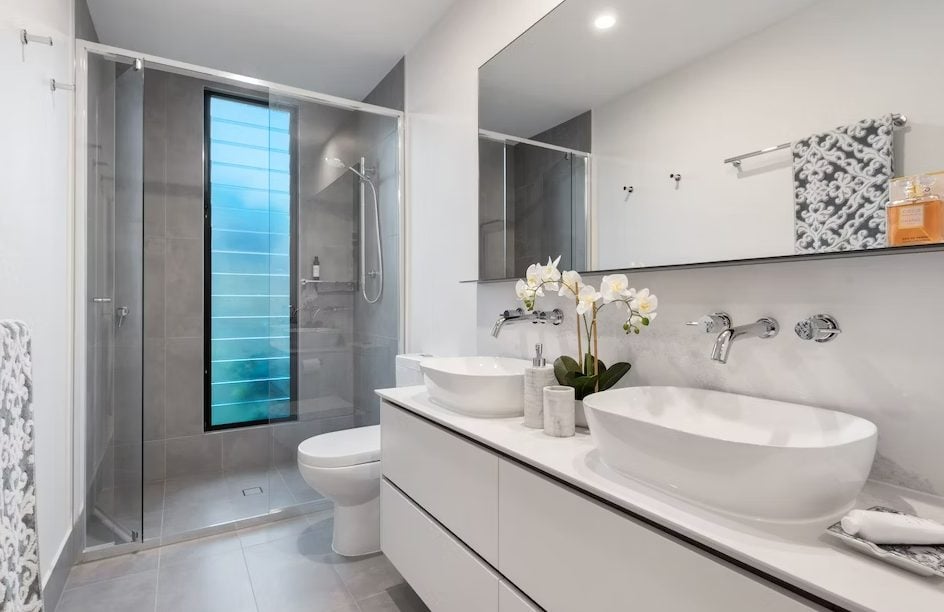


Budgeting for your bathroom renovation requires planning for expenses between $10,000 to $15,000, covering labor, materials, permits, and fees. Material costs vary based on fixtures, tiles, and cabinetry choices, which impact both aesthetics and functionality. Labor expenses fluctuate according to project complexity and contractor rates, while installation costs add up for elements like showers and sinks. Your home remodeling team will help you allocate funds for permits, inspections, and maintain a contingency reserve of 10-20% of your renovation budget. Considering these factors ensures a smooth remodeling project without unexpected financial setbacks.
On average, a bathroom remodeling project typically costs between $10,000 to $15,000, depending on the scope of work and materials chosen. To break it down further, this cost includes expenses such as labor, materials, permits, and any additional fees. Labor costs can vary based on the complexity of the project and the rates of the professionals you hire. When it comes to materials, factors like quality, brand, and quantity play a significant role in determining the final cost. Keep in mind that unexpected issues or changes in the original plan can also impact your budget. To guarantee a successful remodeling project within the average cost range, meticulous planning, research, and clear communication with your contractor are essential.
Materials account for a substantial portion of your bathroom remodeling expenses, and understanding the breakdown of these costs is crucial for effective budget management. When planning your project, consider the following key material expenses:
1. Fixtures and Fittings - This includes items like faucets, showerheads, towel racks, and toilet paper holders. Quality fixtures can enhance the overall look and functionality of your bathroom.
2. Tiles and Flooring - The cost of tiles and flooring materials varies based on the type, quality, and quantity needed for your project. Opting for durable and water-resistant options is essential for a long-lasting renovation.
3. Cabinetry and Countertops - Investing in high-quality cabinets and countertops can greatly impact the aesthetics and storage capacity of your bathroom. Choose materials that offer both style and functionality.
Considering the complexities of your bathroom remodeling project, labor costs and installation fees play a significant role in determining the overall expenditure. Labor costs can vary depending on the scope of work needed, such as plumbing, electrical, tiling, or cabinetry installation. Experienced professionals may charge higher rates but often deliver better quality workmanship. When budgeting for labor, it's essential to obtain multiple quotes from reputable contractors to compare prices and services offered. Installation fees for items like showers, bathtubs, sinks, and toilets can also add up quickly. Make sure that the installation fees are included in your overall budget to avoid unexpected costs. By carefully planning and allocating funds for labor and installation, you can ensure a successful and cost-effective bathroom remodel.
When planning your bathroom remodel, don't forget to factor in the costs associated with obtaining permits and scheduling inspections. Here are three essential things to take into account when budgeting for permits and inspections:
1. Permit Fees: Research the specific permits required for your project and their associated costs. Permit fees can vary based on the scope of work and your location.
2. Inspection Costs: Factor in the fees for inspections that will be necessary throughout the remodeling process. These costs are essential for ensuring your project meets building codes and regulations.
3. Timeline Adjustments: Remember that obtaining permits and scheduling inspections can add time to your project. Plan for potential delays in your renovation timeline to accommodate these necessary steps.
If faced with unforeseen project contingencies during your bathroom renovation, proactive planning and flexibility are essential to overcome challenges efficiently. Begin by setting aside a contingency fund of approximately 10-20% of your overall renovation budget to address any unexpected issues. When unanticipated problems arise, such as plumbing issues or structural concerns, consult with your contractor to evaluate the situation and determine the best course of action. Prioritize safety and adherence to building codes to prevent costly errors in the future. Maintain open communication with your contractor and be prepared to make prompt decisions to keep the project on schedule. By remaining adaptable and proactive, you can navigate unforeseen project contingencies with confidence and minimal disruption.
To save on your bathroom renovation costs, carefully compare quotes from multiple contractors to guarantee you are getting the best value for your budget. Moreover, consider these tips to optimize your savings:
1. Reuse Fixtures: If your current fixtures are in good condition, consider refurbishing them instead of buying new ones.
2. DIY Where Possible: Tackling simple tasks like painting or installing accessories yourself can save on labor costs.
3. Shop Sales and Clearance: Keep an eye out for sales at home improvement stores or online to snag discounted materials without compromising quality.
Other Related Topics: